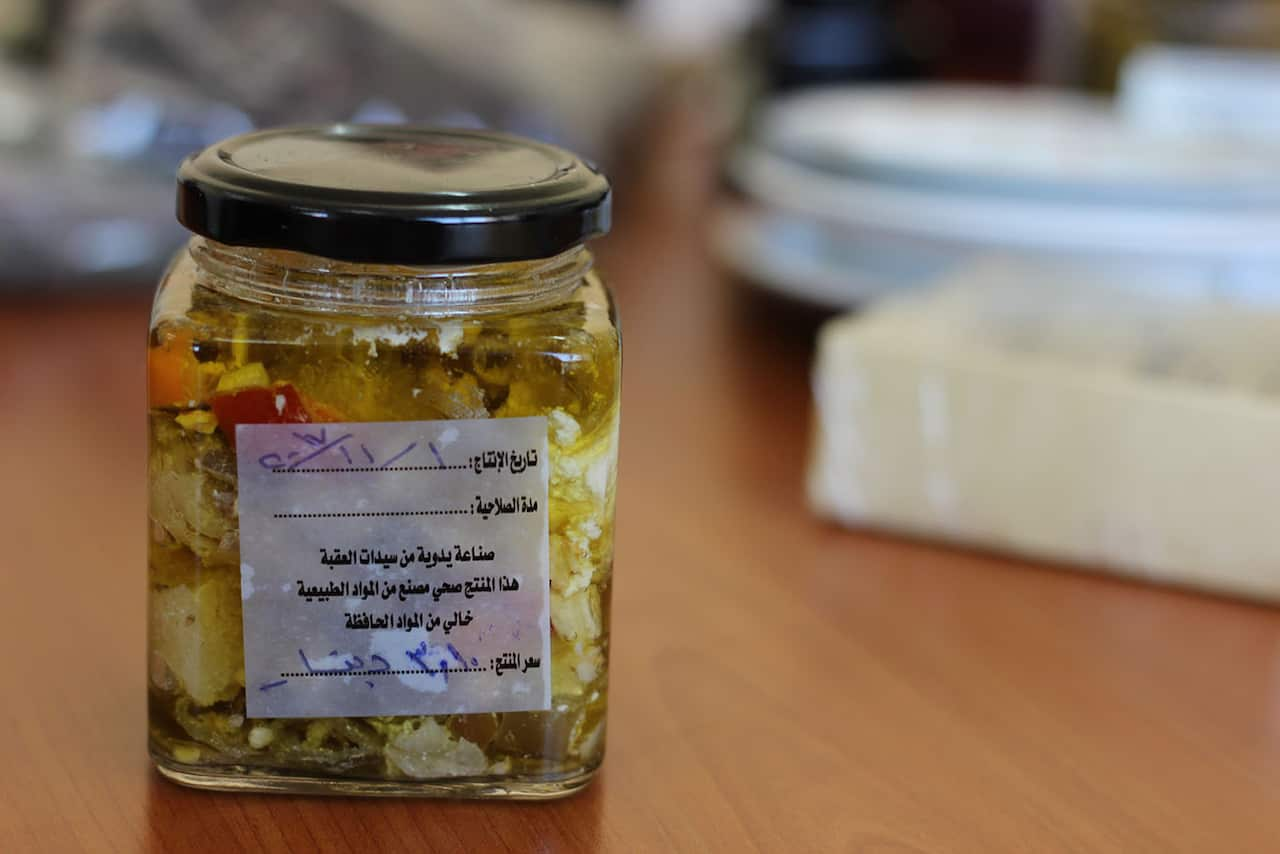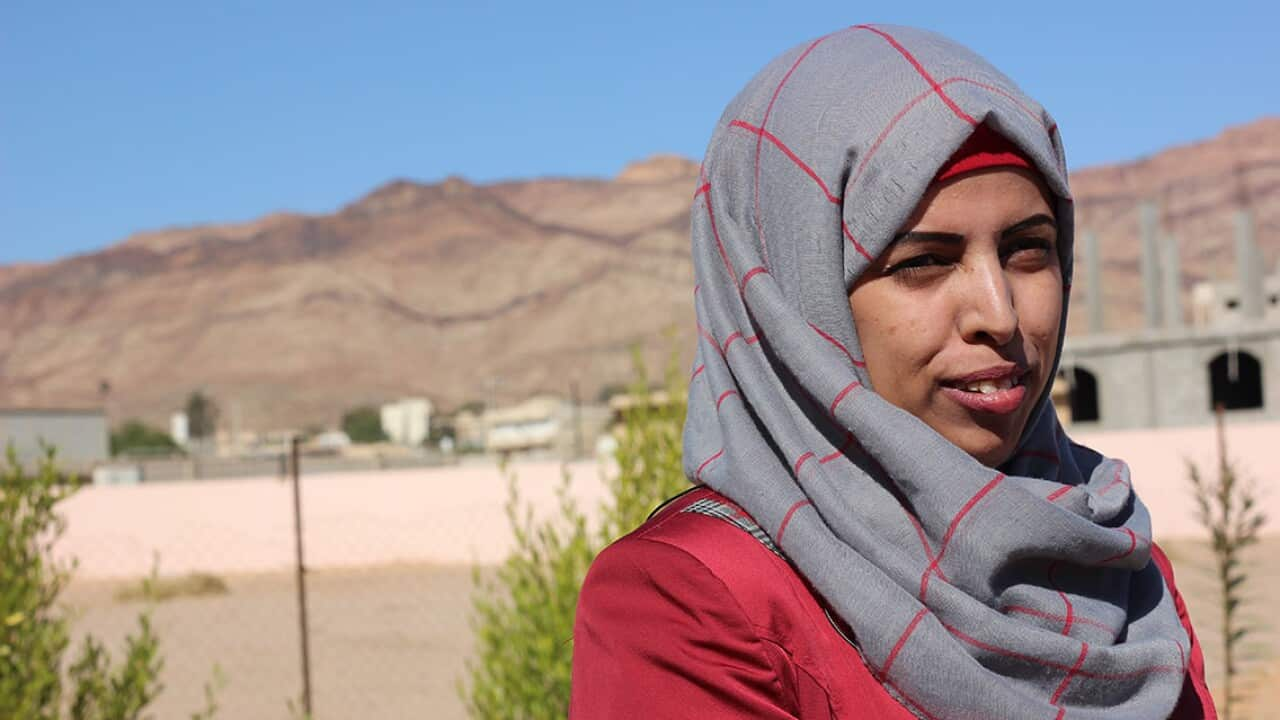Upon arrival of visitors, the ladies of the El Quwira Centre for Development have laid out a table of local produce in welcome. Spicy mokhalal peppers and salty pickled cucumbers are on offer. They’re given to hungry visitors alongside sweet date molasses, apple jam, as well as chocolate and coconut covered dates.
It’s not just a gesture of kindness. Despite the laughter that accompanies it, this spread is a sampling of business products.
Princess Basma Bint Talal - the sister of the late King Hussein for whom the centre is named - has her portrait on the wall. Her eyes are upon the young women gathered there, as they explain their products.
“My name is A’eshah Al Mara’ayeh,” one woman says shyly. “I create yoghurt balls. I usually use strained yoghurt that has been dried and create balls from that.”
A’eshah is one of the women of the Centre who has started her own home-based business. She explains that she is a graduate, with a degree in Business Management. Many Jordanians struggle to make a living, with 18 per cent of the population unemployed. According to this figure is even higher for women, at 33.9 per cent.
Many Jordanians struggle to make a living, with 18 per cent of the population unemployed. According to this figure is even higher for women, at 33.9 per cent.

A’eshah Al Mara’ayeh has a business degree and creates yoghurt balls to sell at the the El Quwira Centre. Image: Shelby Garlick Source: Shelby Garlick
This is despite the fact that women like A'eshah make up a of the overall university enrolments and graduates. It was the centre that taught her the skills she needed to start the business.
“I did not know anything about how it was done,” she explains. “I learnt many new things - the correct methods, how to package, how to create the products themselves."
At some point though, she’d like to have her own line of products “with the products I actually create.”
The project is undertaken with the aim of removing barriers for Jordanians wanting to run home based businesses.
Outside the office where she is speaking, the Centre is buzzing with the talk and laughter of women, as well as the noisy hum of excited chatter from a children's classroom. There is not a man in sight.
“My name is Etab,” says another woman, in a black Adidas outfit and headdress. She holds up a jar of pickles that she has learnt how to create and package.
According to USAID, women make up only 13.2 per cent of the workforce. This is something the agency is aiming to change with the USAID Jordan Local Enterprise Support Project (LENS). The project is undertaken with the aim of removing barriers for Jordanians wanting to run home-based businesses.
They do this by teaching the women how to package the products and market to new audience outside their friends and family. USAID also helps them get a registration and expand. A spokesperson for the Jordanian Ministry of Industry and Trade confirmed that it was a lack of registration that blocked sellers from larger markets. They are now trying to give incentives, such as minimising the costs of registration, for these unofficial businesses to register.
A spokesperson for the Jordanian Ministry of Industry and Trade confirmed that it was a lack of registration that blocked sellers from larger markets. They are now trying to give incentives, such as minimising the costs of registration, for these unofficial businesses to register.

The women of the El Quwira Centre sell pickles, produce and handicrafts with support from USAID. Source: Shelby Garlick
The program is operating in centres all over Jordan. The Quwira centre is run by Fatima al Qawadmeh, who coordinates its activities.
But it’s Ghadeer Al Njadat who is the project's liaison officer here. She is responsible for moving the women's products from the home to the all important buyers.
As she surveys the centre’s unfinished herb garden, Ghadeer explains that for some Jordanian women the pressure to not join the workforce comes not from the government, but from traditional values.
“For the Quwira area traditions dictate that women only work in education," she explains.
“From about three years ago some women started working in the health sector and some have entered into security devices - but their numbers are very small.”
“As for the government, work is usually through civil service and not many opportunities are created.”
For the Quwira area traditions dictate that women only work in education.
Hanan Mousa AlShabaan, an Economic Development Officer with USAID LENS, agrees. She believes that women might “feel more safe” with government jobs.
“They think the private sectors might close for some reason. The management might write your termination,” she says. “That’s why they’re always seeking government employment.”
Hanan thinks it's the wrong perspective, believing instead that government jobs “can be safe but with (sic) not good salaries”.
“Recently they’re trying to change this perspective through the centres.”
This has clearly rubbed off on the women of the centre. One woman displays photographs of a recent market they held with the local produce. Another speaks of how the products have begun to be sold in the southern port city of Aqaba.
There is talk of how Australian clients would react to the delicious date molasses, which the women make so well.
While there might still be a gap between the strong rights given to women, and the social norm of them staying in the household, the women of the Centre cannot be boxed in. Instead A’eshah, Ghadeer and the other ladies of micro businesses choose to continue to expand their horizons.
Video by Shelby Garlick, Alex Chapman, Kate Bettes
The authors travelled to Jordan as part of , a joint program between the University of Technology, Sydney and Swinburne University supported by the .

